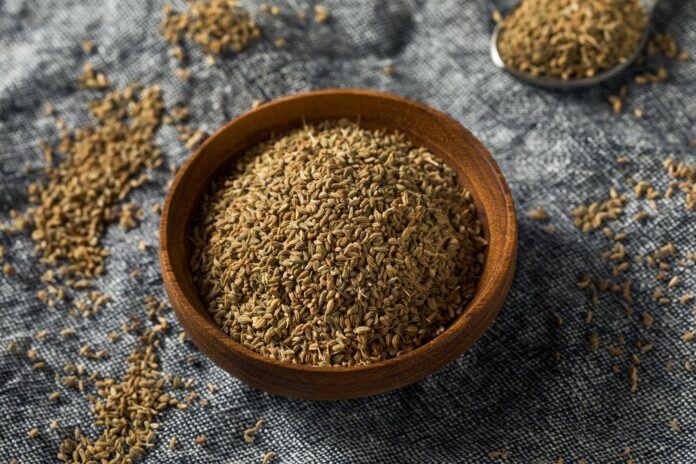INTRODUCTION
Urdu name: Ajwain
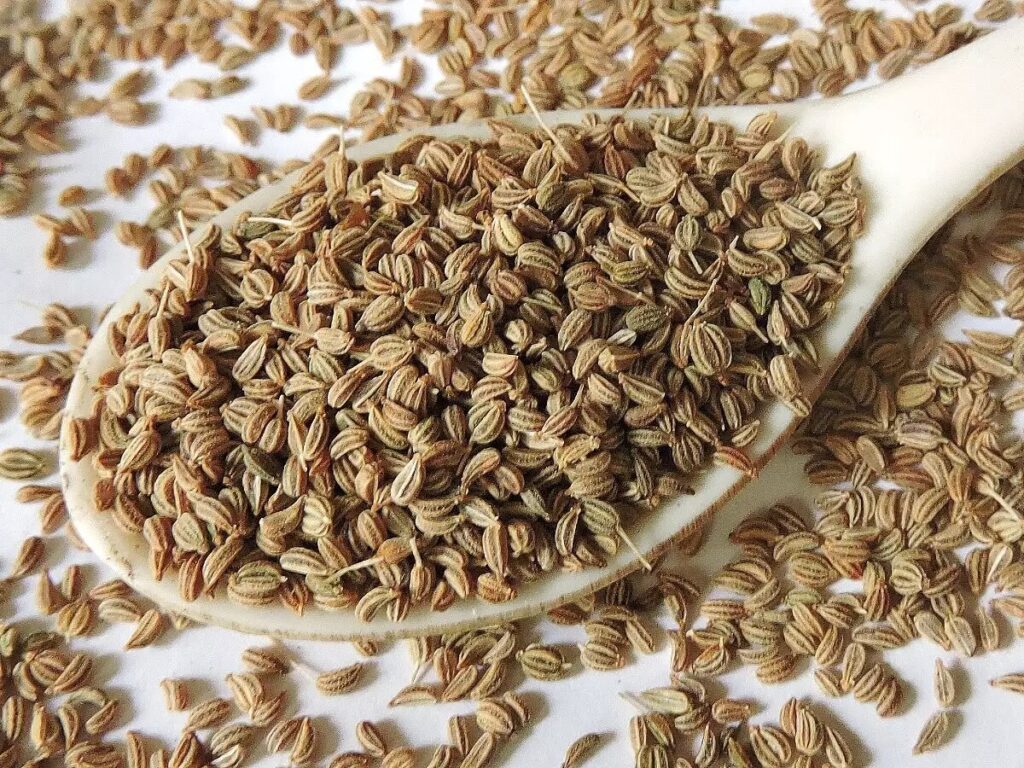
Carom seeds, also known as ajwain, come from the plant Trachyspermum Ammi. These small, grayish-green seeds have a strong, aromatic flavor similar to thyme and are commonly used in cooking, especially in Indian and Middle Eastern dishes. In addition to their culinary uses, carom seeds are known for their health benefits, particularly in improving digestion and relieving gas and bloating. They also possess properties that may help with respiratory issues and support menstrual health, making them a valuable addition to both the kitchen and traditional medicine.
Types
There are several types of carom seeds, mainly categorized by their origin and slight variations in flavor and appearance. Here are the primary types:
- Ajwain (Trachyspermum Ammi):
The most common type, widely used in Indian and Middle Eastern cuisine.
- Egyptian Ajwain (Carum copticum):
Similar in flavor to regular ajwain but is often larger and more aromatic.
- Indian Ajwain:
Known for its strong flavor and is primarily used in Indian cooking and traditional medicine.
- Oman:
A term used in some regions, particularly in Tamil Nadu, India, to refer to ajwain.
Forms
Carom seeds can be found in various forms, each suited for different culinary and medicinal applications. Here are the common forms of carom seeds:
- Whole Seeds:
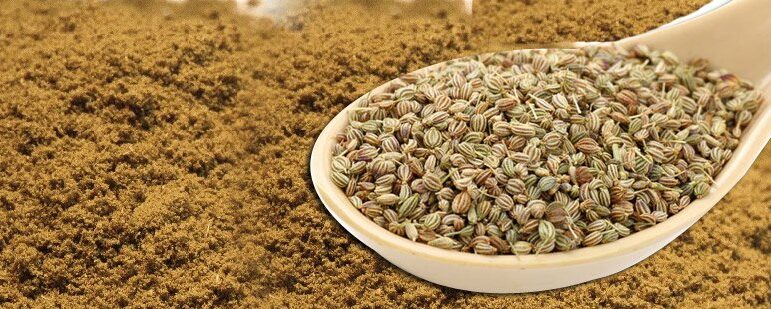
The most common form, used in cooking, spice blends, and traditional remedies.
- Ground Powder:
Finely ground carom seeds used in recipes and herbal formulations, often added to dough or spice mixes.
- Essential Oil:

Extracted from carom seeds, this oil is used for aromatherapy, topical applications, and in some medicinal preparations.
- Tinctures:
Alcohol-based extracts of carom seeds used in herbal medicine for various health benefits.
- Capsules/Tablets:
Processed carom seed powder or extracts available in pill form for convenience in dietary supplementation.
- Infusions/Teas:
Carom seeds steeped in hot water to make a herbal tea, often consumed for digestive health.
Health Benefits
Carom seeds (ajwain) offer several health benefits, making them a valuable addition to both culinary and medicinal practices. Here are some of the key health benefits:
Digestive Health
Active enzymes in ajwain improve the flow of stomach acids, which can help to relieve indigestion, bloating, and gas. The plant can also help to treat peptic ulcers as well as sores in the esophagus, stomach, and intestines.
Infection Prevention
Many of the essential oils in ajwain, most notably thymol and carvacrol, can help to fight the growth of bacteria and fungi. They may also help to fight bacteria like salmonella and E. coli, which can lead to food poisoning and other stomach issues.
Cough and Congestion Relief
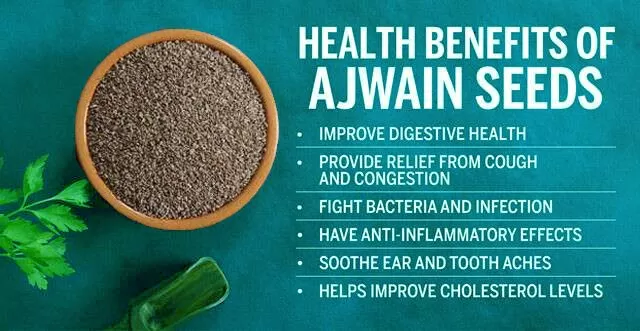
Ajwain can provide relief from coughing as well as clear mucus from your nose, both of which make breathing easier. It may also help to widen the bronchial tubes, which can help those with asthma.
Toothache Relief
Due to the anti-inflammatory properties of thymol and other essential oils, ajwain can help to reduce pain associated with toothaches. Thymol may also help to improve your oral health by fighting bacteria and fungi in the mouth.
Source of Nutrients
Ajwain fruit and seeds offer a variety of nutrients. They mostly contain carbohydrates but also consist of a lot of fiber, protein, and fat. Ajwain is also rich in vitamins and minerals like iron, calcium, phosphorus, and B vitamins
Menstrual Health
Carom seeds (ajwain) are good for menstrual health. They can help regulate periods and reduce cramps and pain during menstruation. Their anti-inflammatory properties provide relief from discomfort, while also helping with bloating and digestion that often occur during this time. Drinking carom seed tea or adding them to food can be a helpful natural remedy for menstrual issues.
Respiratory Relief
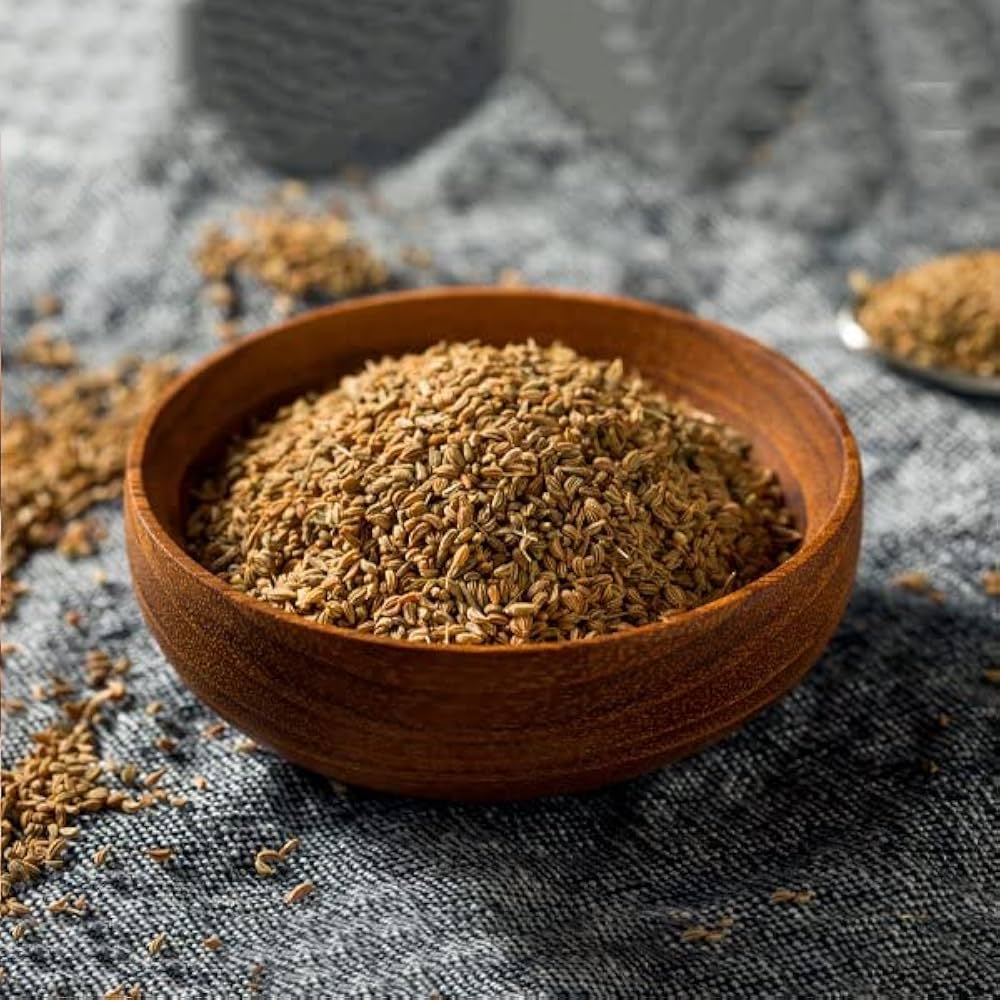
Carom seeds can help alleviate respiratory issues such as coughs and asthma due to their expectorant properties, helping to clear mucus from the airways.
Supports Weight Loss
Carom seeds (ajwain) can help with weight loss by boosting metabolism and promoting digestion. They reduce bloating and may help control appetite, making you feel fuller and preventing overeating. Adding carom seeds to your diet or drinking them as tea can support your weight loss efforts.
Might help with Bladder Stones
Bladder stones, or urinary stones, are hardened lumps of minerals in your bladder. They happen when you don’t fully empty your bladder, causing the urine to become concentrated and mineral salts to crystallize. Ajwain might help treat bladder stones.
Skin Irritation
The thymol and carvacrol in ajwain essential oil are highly irritating to the skin. Common reactions include redness and burning, but these are avoidable with proper dilution. Mix your ajwain essential oil in a fatty carrier oil like sweet almond oil or jojoba oil putting it on your skin.
Side Effects
While carom seeds (ajwain) are generally safe for most people when consumed in moderate amounts, they can have some side effects, including:

- Allergic reactions
- Gastrointestinal issues
- Heartburn
- Interactions with medications
- Pregnancy concerns



